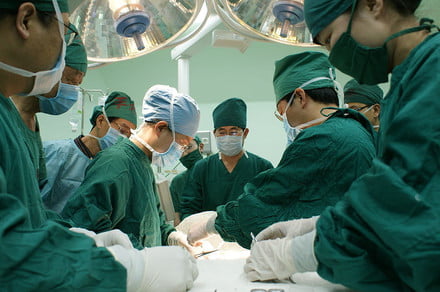It’s no secret that the people are getting wider, heavier, and less healthy. Sloppy diets, lackluster exercise routines, and seemingly insurmountable daily stresses have led to an epidemic of “lifestyle diseases,” conditions caused by the way people live rather than the genes that make them up.
One of the most prevalent of these conditions is type II diabetes, afflicting tens of millions of Americans an imposing an annual cost of over $174 billion, according to the Center for Disease Control. If the problem goes unchecked, as many as a third of American adults could have diabetes by 2050.
Gastric bypass surgery has showed promise for diabetics — but it’s a major procedure with a host of potential complications and requires that a patient have a body mass index of at least 40. As a result, not a whole lot of patients opt in. Of the American’s who qualify, less than one or two percent undergo the operation.
But a study out this week in the journal Nature Materials offers a different approach that could prove to be a viable and less-invasive alternative to surgery. Simply by swallowing a pill before breakfast, lunch, or dinner, patients with type 2 diabetes may be able to coat their intestines with a thin layer, protecting them from blood sugar spikes.
“We envision a pill that a patient can take before a meal that transiently coats the gut to replicate the effects of surgery,” Jeff Karp, a Brigham and Women’s Hospital researcher who worked on the project, told Digital Trends. “During the past nine years, we’ve been working on this idea and have developed a safe gut-coating material that can potentially mimic the beneficial effects of gastric bypass procedures in the form a pill.”
Karp and his team needed a substance that could both coat the intestines and completely dissolve after its protective job was done. They settled on an FDA-approved substance called sucralfate, used to treat gastrointestinal ulcers. By engineering the compound further, they ended up with a substance they’ve called Luminal Coating of the Intestine (LuCI). Once ground into a dry powder, LuCI can be packaged into a pill.
Given to rodents, LuCI formed a thin layer over the animals’ intestines, providing a barrier for three hours from nutrients and helping regulate their blood sugar levels.
“LuCI can be activated in any part of the gastrointestinal tract … to form a temporary physical barrier that isolates that part of gastrointestinal tract,” Karp explained.
Moving forward, the researchers aim to test the substance for its long-term impact in a diabetic model. They hope to expand these trials to humans within the next year or two, with a best-case scenario seeing the treatment come to market in five years.
Editors’ Recommendations
- Haptic VR surgery isn’t for the faint of heart, but it could help surgeons
- A new laser eye surgery fixes your vision without any gnarly eyeball slicing
- Doctors successfully perform the world’s first robot-assisted spinal surgery
- Surgery-free ‘nasal airway remodeler’ boosts airflow in congested patients’ noses
- Tummy ache? Swallow this sensor-studded pill to get a diagnosis on your phone

